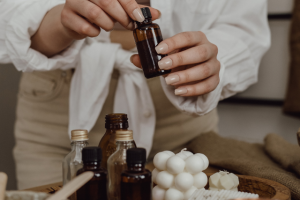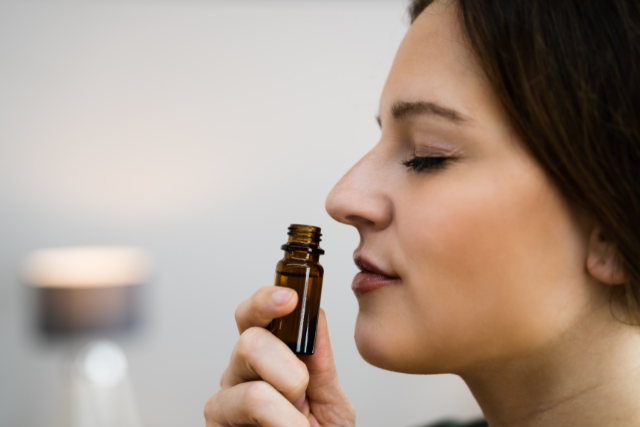93. Essential Oils During Birth: Quick and Easy Tidbits for Practical and Safe Use
By Rachel Mans, SpBCPE, CBE, BAI CD "Don’t diffuse oils into the room. This can be so tempting! BUT, smell is a strong sense, and, during birth, it can be a fickle sense. You may love an aroma one moment, and hate it the next. Once the aroma is in the room, it is very hard to remove."

Essential oils have drastically grown in popularity over the past several years. Info is everywhere! But while general essential oil information is easy to find, information regarding their use during birth is more scarce.
Did you know that essential oils can affect your body differently during pregnancy and birth? Did you know some oils are unsafe for babies, especially newborns? Do you know how to handle an adverse reaction if one surprises you during your birthing time? If you don’t know the answers to those, you’re not alone!
Your Body During Birth
During your birthing time (and even the end of your pregnancy), your body goes through many changes that affect the way essential oils react with it.
Skin-stretching makes the oil more easily-absorbable, requiring less of it to be effective. It can also make the skin on your belly more sensitive to outside chemicals, natural or not, being placed on it.
Hormonal changes affect the way your body might react to different essential oils. Something that wouldn’t usually negatively affect your body could trigger a sensitivity. The essential oils themselves could also interfere with the normal hormonal process of pregnancy and birth.
Body temperature and blood pressure also often increase during the birthing process. An increase in body temperature can cause the oil to more easily absorb into your body and the increased blood pressure can cause it to circulate more quickly within your body. This means that a smaller amount of oil can have a bigger impact (either negative or positive) on your body.
All of this needs to be considered when choosing which oils to use during birth and HOW to use them.

General Tips/Guidelines
With all of that being considered, there are some tips or guidelines that will help you safely and effectively use essential oils in your birthing space.
- Don’t diffuse oils into the room. This can be so tempting! BUT, smell is a strong sense, and, during birth, it can be a fickle sense. You may love an aroma one moment, and hate it the next. Once the aroma is in the room, it is very hard to remove. And as far as your perfect baby goes, he or she likes the smell of birth and NOT essential oils; those scents are often far too strong for them. Instead, put the oils on a towel and tuck it into your bra strap or keep it close to your face. Then you can easily discard it whenever you are finished with it.
- Don’t ingest the oils. There is really no need for this during birth and evidence is scattered on whether this is safe or not during pregnancy. Inhalation or the occasional topical use is quite effective.
- Topical use should be tested ahead of time, TWICE. If you are going to use the oils topically, you should test the diluted essential oil on your skin towards the end of pregnancy. Apply the diluted oil on your wrist or the inside of your arm and let it sit for 10+ minutes. A few days later, do it again! If your pregnant body is sensitive to the oil, it likely won’t react until the second test; it requires the first test to be sensitized before your body will accurately react to it.
- During birth, dilute oils using a 1% dilution and don’t place oils on any area of your body that the baby might touch. If you do, properly cleanse the area before/during pushing (ex. Stomach or chest).
- Always be ready to handle a negative reaction if you use it topically during birth. Have a towel with a carrier oil (maybe coconut, olive, or almond) ready to wipe off the skin where the oil was placed. After wiping well with the oil, you can use a gentle soap and water to finish cleaning the area.
- Don’t put essential oils in a tub if you plan to birth in it.
- DO NOT use peppermint, or any blend that contains peppermint, around the baby, including during your birthing time. People commonly use peppermint for nausea, not realizing it could hyperstimulate the baby’s lungs and make it hard for them to breathe!

10 Safe and Supportive Oils
Now the fun part! Here is a list of 10 essential oils that could support almost any emotional need during your birth. You can also take advantage of these in the postpartum period, too.
Orange: Most people love this smell; it creates a sense of happiness, warmth, and energy.
Lemon: Great for nausea, energy, and overall feeling happy.
Ginger: Sometimes stronger for nausea than lemon, but takes longer to work.
Black Pepper: This is warming and great for the lower back, when diluted properly and kept away from any place the baby will come in contact with.
Clary Sage: This can encourage contractions, but also reduce the amount of pain that you feel.
Cedarwood: Great for giving a sense of “I’m going to be ok” when anyone in the room is anxious, stressed, or feels like they are losing control.
Frankincense: Another good option for relieving stress and inducing calmness.
Lavender: Great for inducing rest, reducing blood pressure (do NOT use with low pressure), and relieving stress. Can also help speed vaginal healing when on a pad postpartum.
Roman Chamomile: Can induce rest better than lavender, but is more expensive.
Helichrysum: Wonderful for vaginal healing when placed on a pad postpartum, but is more expensive than lavender. Some say it supports safe bleeding after birth, too.
Pick and choose, or enjoy them all. Either way, you can feel confident that you used them safely and effectively!
 Rachel has been studying birth for over a decade now, ever since her first pregnancy. It was that birth that ultimately inspired her passion for supporting other moms/families during this life-changing experience. She is the owner and creator of The NaturalBirth Site, as well as the podcast, The NaturalBirth Talk. She is also a birth doula, childbirth educator, and midwife’s assistant in the St. Louis, MO area, under the name Rachel Mans, Doula. She loves teaching parents to trust their body, baby, and innate instincts! There is little free time as a homeschooling mama of five, but she loves caring for her garden, going on walks/hikes, and playing board/card games with the whole family when she has the chance.
Rachel has been studying birth for over a decade now, ever since her first pregnancy. It was that birth that ultimately inspired her passion for supporting other moms/families during this life-changing experience. She is the owner and creator of The NaturalBirth Site, as well as the podcast, The NaturalBirth Talk. She is also a birth doula, childbirth educator, and midwife’s assistant in the St. Louis, MO area, under the name Rachel Mans, Doula. She loves teaching parents to trust their body, baby, and innate instincts! There is little free time as a homeschooling mama of five, but she loves caring for her garden, going on walks/hikes, and playing board/card games with the whole family when she has the chance.
Instagram and Facebook: @TheNaturalBirthSite


